带薪年休假规定 英文版 annual leave
英语年假请假条模板

英语年假请假条模板英语年假请假条模板英语年假请假条模板or immediate treatment of m teeth. I have been experiening a stinging pain, depriving me of m sleep during the past fortnight. The situation ould orsen, should infetion our. Conerning m orkloa d: As Frida is not as bus as the other eekdas, I think a one-da leave this Frida ma be the best solution. I apologize for the inonveniene m absene from ork ma ause. 接着,在假条的最后一段,应写上您希望获得准假的句子,或者具体等候答复的Thanks. I ill all ou at 1:30p.m. or ou an all me at an time. 最后,你只需要把以上几段综合起来,就是一则完整的请假条,看看,是不是很简单?那么关于请假,我们应该懂得哪些理由和英语单词呢?take a da off ask for leave (请假) grant leave (准假)sik leave (病假) maternit leave(产假) annual leave (年假) on leave告假中 paid leave带薪假工作中,要使用英语的地方太越多了,要用英语写邮件、用英语发传真打电话、文件是英语的,电脑内设程序也都是英文版的,英语充斥着职场和生活,职场中还有哪些场景会用到英语呢?安格英语每周三晚20:00英语公开课,教你学会职场常用口语及技能,分分钟玩转职场!篇二:年假请假条请假条尊敬的领导:根据国家和单位关于带薪年休假的有关规定,我拟于201X年 10 月8日至201X年批准为盼! 特此申请月12日休假5 天。
BEC商务英语热词:带薪休假英文怎么说

BEC商务英语热词:带薪休假英文怎么说为了帮助大家备考bec,下面小编给大家带来BEC商务英语热词:带薪休假英文怎么说,希望对你们有所帮助。
BEC商务英语热词:带薪休假英文怎么说?Employees who have worked continuously for one year or more are entitled to paid annual leave.职工连续工作满12个月以上的,享受带薪年休假。
New Jersey may be poised to become the third state to require companies to offer six weeks of paid leave to workers wishing to care for a new child or sick relative.新泽西州将要求公司给予员工六周带薪休假,这些假期可以用来照顾新生婴儿或生病的亲戚。
此前已有另外两个州开始实施这项措施了。
"热词”解析带薪休假实际上并不是一个新词,早在2008年,国家就出台了《职工带薪年休假条例》以保证员工的正当权利。
上文中的第一句例句即引用自该条例的英文版。
此处把带薪年休假译为“paid annual leave”,由此引申出来的年假即为“annual leave”。
第二句例句引用自美联社的一篇报道,可见带薪休假英文表达为paid leave是通用的说法。
除了paid leave外,还有几种可以表示带薪休假的英文表达:paid vacation(美式用法),paid holiday(英式用法),paid time off(较口语)。
例句:Mr. Saunders believes that he deserves more paid vacations.桑德斯先生认为他理应得到更多的带薪休假。
The Luxembourg-based court insisted that employers should honour workers’ rights to both time off sick and paid holidays.这家位于卢森堡的法院坚持认为,雇主必须尊重员工休假期间生病补假和带薪假期的权利。
年休假英文怎么说英语怎么写
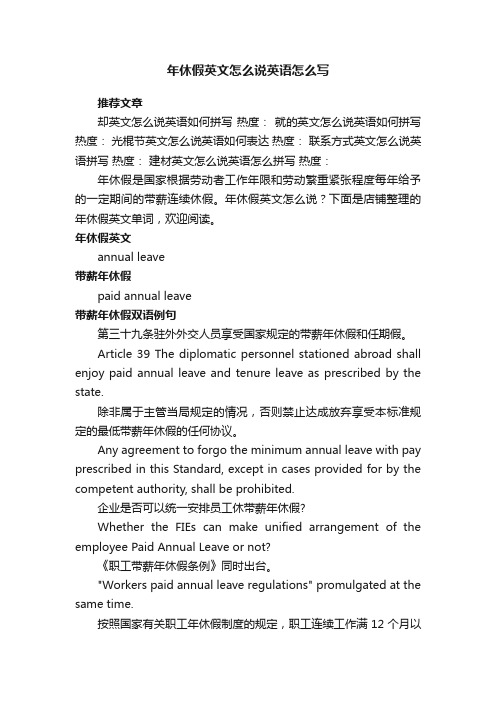
年休假英文怎么说英语怎么写推荐文章却英文怎么说英语如何拼写热度:就的英文怎么说英语如何拼写热度:光棍节英文怎么说英语如何表达热度:联系方式英文怎么说英语拼写热度:建材英文怎么说英语怎么拼写热度:年休假是国家根据劳动者工作年限和劳动繁重紧张程度每年给予的一定期间的带薪连续休假。
年休假英文怎么说?下面是店铺整理的年休假英文单词,欢迎阅读。
年休假英文annual leave带薪年休假paid annual leave带薪年休假双语例句第三十九条驻外外交人员享受国家规定的带薪年休假和任期假。
Article 39 The diplomatic personnel stationed abroad shall enjoy paid annual leave and tenure leave as prescribed by the state.除非属于主管当局规定的情况,否则禁止达成放弃享受本标准规定的最低带薪年休假的任何协议。
Any agreement to forgo the minimum annual leave with pay prescribed in this Standard, except in cases provided for by the competent authority, shall be prohibited.企业是否可以统一安排员工休带薪年休假?Whether the FIEs can make unified arrangement of the employee Paid Annual Leave or not?《职工带薪年休假条例》同时出台。
"Workers paid annual leave regulations" promulgated at the same time.按照国家有关职工年休假制度的规定,职工连续工作满12个月以上即可享受带薪年休假。
annual leave使用例句

annual leave使用例句【释义】annual leave年假:每年向职员授予的休假时间。
【短语】1annual leave terms年假条款2annual leave pay年假薪酬3Paid annual leave带薪年假4final annual leave最终年假5split annual leave分期放取年假6annual leave passage年假旅费7overseas annual leave海外年假8annual leave entitlement可享有的年假【例句】1How much annual leave do you get?你们的年假有多长?2Our annual leave is thirty days.我们每年休假30天。
3He has six weeks annual leave.他一年有六个星期的休假。
4He is on annual leave.他休年假去了。
5One of its services is scheduling annual leave.它的服务之一就是安排年假。
6There is no mandatory paid annual leave in the U.S.美国没有强制带薪年假。
7When will you take the balance of your annual leave?你打算什么时候使用剩余的年假?。
8Party B shall be entitled to annual leave with salary.乙方按国家规定享受甲方的带薪年假。
9Me:Maximum16days,that's the annual leave I can get.他没接最多16天。
那时我所有的年休假。
10Tom:Are you looking forward to taking your annual leave this year?汤姆︰你对今年的年假很期待吗?11Justified absences from work shall not be considered as annual leave.合理的缺勤不应被视作年假。
企业职工带薪年休假实施办法中英版
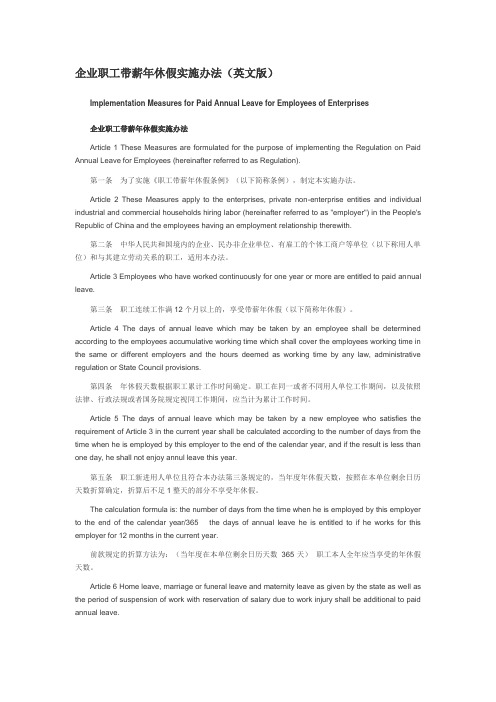
Article 3 Employees who have worked continuously for one year or more are entitled to paid annual leave.
前款规定的折算方法为:(当年度在本单位剩余日历天数÷365天)×职工本人全年应当享受的年休假天数。
Article 6 Home leave, marriage or funeral leave and maternity leave as given by the state as well as the period of suspension of work with reservation of salary due to work injury shall be additional to paid annual leave.
第一条 为了实施《职工带薪年休假条例》(以下简称条例),制定本实施办法。
Article 2 These Measures apply to the enterprises, private non-enterprise entities and individual industrial and commercial households hiring labor (hereinafter referred to as "employer") in the People's Republic of China and the employees having an employment relationship therewith.
职工带薪年休假条例(英文版)
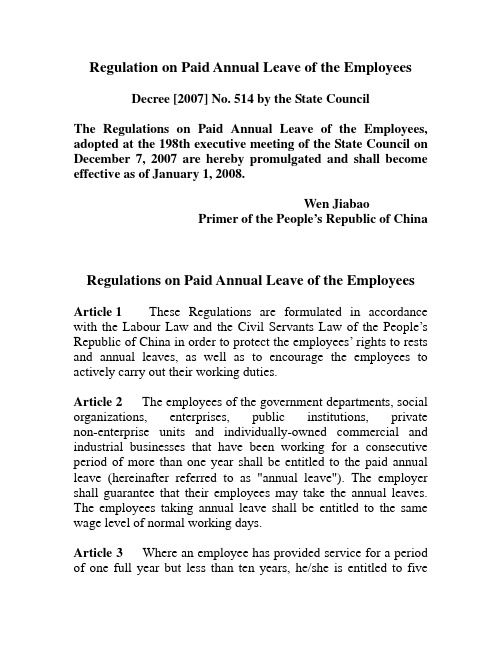
Regulation on Paid Annual Leave of the Employees Decree [2007] No. 514 by the State CouncilThe Regulations on Paid Annual Leave of the Employees, adopted at the 198th executive meeting of the State Council on December 7, 2007 are hereby promulgated and shall become effective as of January 1, 2008.Wen JiabaoPrimer of the People’s Republic of ChinaRegulations on Paid Annual Leave of the Employees Article 1 These Regulations are formulated in accordance with the Labour Law and the Civil Servants Law of the People’s Republic of China in order to protect the employees’ rights to rests and annual leaves, as well as to encourage the employees to actively carry out their working duties.Article 2 The employees of the government departments, social organizations, enterprises, public institutions, private non-enterprise units and individually-owned commercial and industrial businesses that have been working for a consecutive period of more than one year shall be entitled to the paid annual leave (hereinafter referred to as "annual leave"). The employer shall guarantee that their employees may take the annual leaves. The employees taking annual leave shall be entitled to the same wage level of normal working days.Article 3Where an employee has provided service for a periodof one full year but less than ten years, he/she is entitled to fivedays of annual leave; where he/she has served for a period of ten full years but less than twenty years, the entitled annual leave shall be ten days; and for a service period over twenty years, the entitled annual leave shall be fifteen days.The statutory national holidays and rest days shall not be included in the annual leave.Article 4 An employee shall not be entitled to annual leave for the current year where he/she is under any of the following circumstances:(1) The employee is entitled to summer and winter vacations in accordance with the laws and regulations, and the number of days of such vacations exceeds that of his/her annual leave;(2) The employee has accumulatively taken more than twenty days of casual leave and the employer has not reduced his/her wage level thereof in accordance with the regulations;(3) The employee with service period of one full year but less than ten years has accumulatively taken more than two months of sick leave;(4) The employee with service period of ten full years but less than twenty years has accumulatively taken more than three months of sick leave;(5) The employee with service period over twenty years has accumulatively taken more than four months of sick leave.Article 5 The employer shall, considering the specific conditions of production and work, as well as the individual preferences of the employees, coordinate and arrange the annual leave of its employees.Annual leave may be arranged in a concentrated period or in several periods of time within one year, but it generally shall not span beyond one year. The employers may make annual leavearrangement for their employees that span beyond one year where they need to make such arrangement due to their production and job specialties.Where the employers can not arrange annual leave for the employees due to production or working requirements, they may, with the consent of the concerned employees, not arrange annual leave. For the annual leave that should have been taken by the employees but otherwise, the employers shall pay remuneration for annual leave to the concerned employees rating 300% of the daily wage rate of such employees.Article 6The personnel administration departments and labour and social security administration departments of the People's Governments at county level or above shall actively conduct supervision and examination on the implementation of these Regulations by the employers as per their respective jurisdictions. The trade unions shall protect the employees’ rights to annual leave in accordance with the laws and regulations.Article 7 Where an employer fails to arrange annual leave for the employees and meanwhile refuses to pay remuneration for annual leave in accordance with these Regulations, the personnel departments or the labour and social security departments of the People's Governments at county level or above shall order rectification within a period of time as per their respective jurisdictions. In case that no rectification has been made within the time limit, such employer, in addition to the payment of remuneration for annual leave, shall be ordered to make compensation to the concerned employees rating the same amount with the remuneration for annual leave. Where the employer refuses to make payment of remuneration for annual leave and compensation, and the personnel of such employer are public servants or administered in reference to the Civil Servants Law, theperson-in-charge that is held directly responsible and other directly responsible personnel shall be penalized in accordance with the law, if such employer is categorized otherwise, the labour and social security department, the personnel department or the concerned employee shall apply for compulsory enforcement by a People's Court.Article 8 Where the employees and the employers confront disputes over annual leave, the relevant issues shall be handled in accordance with relevant laws and administrative regulations of the State.Article 9 The personnel administration department and the labour and social security administration department of the State Council shall each formulate the implementing rules of the Regulations in accordance with their respective authorities.Article 10 These Regulations shall become effective as of January 1, 2008.(In case of any discrepancy between the English translation and the original Chinese text, the Chinese text shall prevail. ---translator)职工带薪年休假条例中华人民共和国国务院令第514号《职工带薪年休假条例》已经2007年12月7日国务院第198次常务会议通过,现予公布,自2008年1月1日起施行。
年休假(Annualleave)
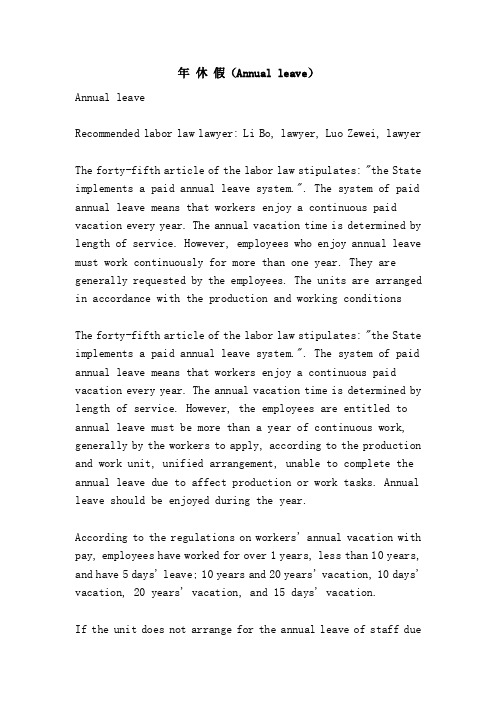
年休假(Annual leave)Annual leaveRecommended labor law lawyer: Li Bo, lawyer, Luo Zewei, lawyerThe forty-fifth article of the labor law stipulates: "the State implements a paid annual leave system.". The system of paid annual leave means that workers enjoy a continuous paid vacation every year. The annual vacation time is determined by length of service. However, employees who enjoy annual leave must work continuously for more than one year. They are generally requested by the employees. The units are arranged in accordance with the production and working conditionsThe forty-fifth article of the labor law stipulates: "the State implements a paid annual leave system.". The system of paid annual leave means that workers enjoy a continuous paid vacation every year. The annual vacation time is determined by length of service. However, the employees are entitled to annual leave must be more than a year of continuous work, generally by the workers to apply, according to the production and work unit, unified arrangement, unable to complete the annual leave due to affect production or work tasks. Annual leave should be enjoyed during the year.According to the regulations on workers' annual vacation with pay, employees have worked for over 1 years, less than 10 years, and have 5 days' leave; 10 years and 20 years' vacation, 10 days' vacation, 20 years' vacation, and 15 days' vacation.If the unit does not arrange for the annual leave of staff dueto the needs of the job, it may not arrange for the workers' annual leave without the consent of the employees themselves. For employees whose annual vacation days should not be taken off, the unit shall pay annual wages and salaries in accordance with 300% of the daily wage income of the staff and workers.How is overtime calculated?The standard work hour system can be carried out according to the thirty-sixth labor law. The working system of the State shall not exceed eight hours a day, and the average working hours shall not exceed forty-four hours per week".Article thirty-sixth the working hours of the workers do not exceed 8 hours a day, the average working hours of no more than 44 hours working hours system.The thirty-first law of the labor contract stipulates that the employing unit shall strictly implement the labor quota standard and shall not compel or force laborers to work overtime. Where the employer arranges for overtime work, it shall pay overtime pay to the worker in accordance with the relevant regulations of the state.Article forty-fourth of the labor law has one of the following circumstances, the employer shall pay the remuneration in accordance with the following standards higher than the normal working hours of workers' wages:(1) to arrange for workers to extend their working hours, and to pay one hundred and fifty percent of the wages not less thanthe wages;(two) working arrangements for the rest day cannot arrange the work, pay wages not less than two hundred percent of the wages;(three) to pay the wages of three hundred percent of the wages of the workers who work in the statutory holiday.Overtime related knowledge:Overtime pay refers to the labor remuneration paid by laborers in accordance with the requirements of production and work of the employing units and continuing to produce labor or work outside the prescribed work hours. Working overtime, prolonging working hours, and increasing extra labor should be paid reasonably. For workers, overtime is a kind of compensation, because the pay excess labor; for employers to pay overtime, can effectively restrain the employer at random to lengthen working hours, to protect the legitimate rights and interests of workers. According to the labor law and the relevant regulations of the state, the employing unit shall pay the wages paid in excess of the normal working hours of the workers in the case of prolonging the working hours of the laborers, that is, overtime pay. This article affirms the legislative spirit of the labor law and other relevant state regulations concerning the payment of overtime pay.In accordance with the provisions of the labor law article forty-fourth, the specific standard is: pay overtime arrangements for workers in the standard working days to lengthen working hours, pay wages not less than one hundred andfifty percent of the wages of workers; work arrangements for the rest day cannot arrange the work, non payment of wages lower than the wages paid two hundred percent; arrangements for working in statutory leave, pay no less than three hundred percent of the wages.Beyond standard work time extended working hours, rest days, statutory holidays are arranged to work, the workers occupied the rest of the time, should be strictly limited, higher than the normal working time of payment of wages is a limitation measures adopted the country. However, the organization of labor in the above three kinds of situations are not exactly the same, such as the legal holiday for employees, the rest is more important than usual and rest days, also affect the spiritual life style of workers and other social activities, it is unable to make up for compensatory measures, therefore, should be given a higher salary. When the employer meets the above conditions and arranges for the workers to work overtime, they shall pay the overtime fees in strict accordance with the labor law and the provisions of this law. Which belong to a case of overtime, should implement the provisions of the law made in this case, each other can not be confused, can not replace, otherwise is a violation of the labor law and the law, is a violation of the rights of workers, shall bear legal responsibility according to law.In accordance with the provisions of this article, forcing labourers to work overtime in disguised form shall be regarded as contrary to the provisions of the labor law and the working hours of workers shall be extended. A worker may, in accordance with the labor law and the relevant provisions of this law,require the employer to reissue its remuneration for working overtime in order to complete the quota of labor in excess of a reasonable amount.Specific calculation of statutory holiday overtimeRecommended labor law lawyer: Li Bo, lawyer, Luo Zewei, lawyerThe calculation of statutory holiday overtime 1. assuming that the wage is 1500 yuan, then the other 100 holiday overtime, so it is legal? The following algorithm (1500/30*3) - (1500/30) on the end of the month because the wages paid, so only two times the compensation 2., assuming a month 4 Sunday, Sunday overtime on the other, a double salary is 50 yuan. Because it is still get a basic salary overtimeSpecific calculation of statutory holiday overtime1. assuming the salary is 1500 yuan, then the holiday overtime company issued another 100, so legal?The following is the algorithm, (1500/30*3) - (1500/30) on the end of the month because the wages paid, so only two times the compensation,2., assuming 4 months a month, Sunday, Sunday work overtime, the other doubled wages, that is 50 yuan. Because that day is not working overtime, the basic wage is still the same, then work overtime only with the usual wage is the sameQ1: wants to ask you, that's the rule of law. The bottom lineis three times the basic salary, or another three timesQ2: and the basic daily wage algorithm, is 1500/30 or 1500/26, if the latter, that is, there is no basic wage holiday day terms?Considering the network law:Q1 holiday overtime (11 days) is more than 3 times, and if your daily wage is 100 yuan, overtime pay is based on 100 yuan to pay you 300 yuan overtime payQ2, you first need to understand what is "system work day" and "paid work day""I. calculation of the working hours of the systemWorking days: 365 days, -104 days (rest days), -11 days (legal holidays) =250 daysSeason working days: 250 days / 4 days / season =62.5 seasonMonthly working days: 250 days, December =20.83 days / monthWorking hours: monthly, quarterly, annual work days multiplied by 8 hours per day.Two, daily wage, hourly wage conversionDaily wage: monthly salary, monthly paid daysSalary: monthly salary / hour (monthly paid days * 8 hours).Monthly paid days = (365 -104 days), December =21.75 daysIf your salary is 2175 yuan, then the daily wage is 100 yuan, holiday overtime is 300 yuan. If there is a holiday overtime this month, it should be issued to you 2175+300=3475 yuan。
职工带薪年休假条例(英文版)汇总
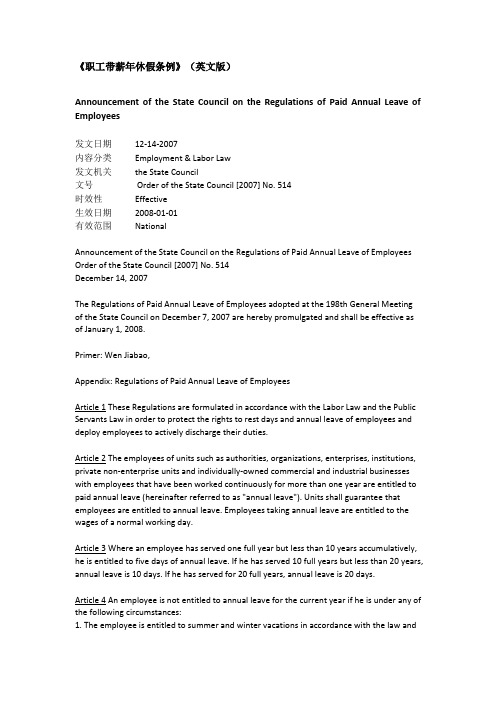
《职工带薪年休假条例》(英文版)Announcement of the State Council on the Regulations of Paid Annual Leave of Employees发文日期12-14-2007内容分类Employment & Labor Law发文机关the State Council文号 Order of the State Council [2007] No. 514时效性Effective生效日期2008-01-01有效范围NationalAnnouncement of the State Council on the Regulations of Paid Annual Leave of Employees Order of the State Council [2007] No. 514December 14, 2007The Regulations of Paid Annual Leave of Employees adopted at the 198th General Meeting of the State Council on December 7, 2007 are hereby promulgated and shall be effective as of January 1, 2008.Primer: Wen Jiabao,Appendix: Regulations of Paid Annual Leave of EmployeesArticle 1 These Regulations are formulated in accordance with the Labor Law and the Public Servants Law in order to protect the rights to rest days and annual leave of employees and deploy employees to actively discharge their duties.Article 2 The employees of units such as authorities, organizations, enterprises, institutions, private non-enterprise units and individually-owned commercial and industrial businesses with employees that have been worked continuously for more than one year are entitled to paid annual leave (hereinafter referred to as "annual leave"). Units shall guarantee that employees are entitled to annual leave. Employees taking annual leave are entitled to the wages of a normal working day.Article 3 Where an employee has served one full year but less than 10 years accumulatively, he is entitled to five days of annual leave. If he has served 10 full years but less than 20 years, annual leave is 10 days. If he has served for 20 full years, annual leave is 20 days.Article 4 An employee is not entitled to annual leave for the current year if he is under any of the following circumstances:1. The employee is entitled to summer and winter vacations in accordance with the law andthe number of days of such vacations is more than that of his annual leave;2. The employee has taken more than 20 days of casual leave accumulatively and his unit does not deduct wages in accordance with provisions;3. The employee has served one full year accumulatively but less than 10 years and has taken more than two months of sick leave accumulatively;4. The employee has served 10 full years accumulatively but less than 20 years and has taken more than three months of sick leave accumulatively;5. The employee has served more than 20 full years and has taken more than four months of sick leave accumulatively.Article 5 Units shall coordinate and arrange for the annual leave of employees on the basis of the specific conditions of production and work and the individual preference of employees.Annual leave may be centrally arranged within one year or in several periods and does not span more than one year in general. Units may make such arrangement that spans more than one year if they have a genuine need for such arrangement due to production and job specialties.Units that cannot arrange for annual leave for employees due to job requirements, they may not arrange for annual leave with the consent of such employees. In respect of the annual leave that should have been taken but otherwise, units shall pay wage remuneration to such employees at the rate of 300% of the daily wage income of such employees.Article 6 The personnel department and the labor security department of people's governments at the county level or above shall actively conduct supervision and examination on the implementation of these Regulations by units in accordance with their authority.Labor organizations shall protect the rights to annual leave of employees in accordance with the law.Article 7 Where a unit fails to arrange for annual leave for employees and pay wage remuneration on annual leave in accordance with the Regulations, the personnel department or the labor security department of people's governments at the county level or above shall order rectification within a time limit. If no rectification is made within the time limit, such unit shall be ordered payment of wage remuneration on annual leave and also make additional compensation to employees on the basis of the amount of the wage remuneration of annual leave. Where no wage remuneration on annual leave or compensation is made, and the personnel of such units are public servants or administered with reference to the Public Servants Law, the person-in-charge that is directly responsible and other directly responsible personnel shall be punished in accordance with the law, if such unit belongs to other categories, the labor security department, the personnel department or the employee shall apply for compulsory implementation by a people's court.Article 8 Where employees and units have dispute over annual leave, it shall be dealt with in accordance with the relevant laws and administrative regulations of the state.Article 9 The personnel department of the State Council and the labor security department of the State Council shall formulate implementing procedures of the Regulations respectively in accordance with their respective authority.Article 10 The Regulations shall be effective as of January 1, 2008.。
Annual Leave Policy

4. Next year’s mandatory (only applicable for a few Q4 new hires, or over-use of current year’s total annual leave entitlement) 下一年度法定 年假 (发生于少数当年四季度新员工,或员工超额使用当年全部年假额度情况)
新休假管理系统相应有两个字段: 法定年休假和公司补充年休假 • 3 Christmas holidays are added to EE supplementary annual leave
圣诞节3天加入到员工补充年休假中
- 5 fixed days 5 天公司集中统一使用年休假
• 3 days in Christmas 圣诞节3天 • 2 days in spring festival (Corp arrange details accordingly) 春节前后2天 • Except for above 5 fixed days, EE can flexibly arrange other annual leave
• Mandatory annual leave eligibility 法定年休假享受条件 Continuous working for 12+ months without interruption连续工作12 个月以上
• Company can arrange EE annual leave by both fixed & flexible approach
- 如果您是在2008年1月1日之前加入GE,请填写如下信息: If you join GE before Jan 1st, 2008, please go here:
公务员带薪年休假条例文档2篇

公务员带薪年休假条例文档2篇Official paid annual leave regulations公务员带薪年休假条例文档2篇小泰温馨提示:规章制度是指用人单位制定的组织劳动过程和进行劳动管理的规则和制度的总和。
本文档根据规则制度书写要求展开说明,具有实践指导意义,便于学习和使用,本文下载后内容可随意修改调整修改及打印。
本文简要目录如下:【下载该文档后使用Word打开,按住键盘Ctrl键且鼠标单击目录内容即可跳转到对应篇章】1、篇章1:公务员带薪年休假条例文档2、篇章2:《职工带薪年休假条例》全文文档篇章1:公务员带薪年休假条例文档休息休假是指员工在正常工作之余,包括工作日的休息以及周末、节假日、年休假、探亲假等。
是员工依法应有的一项权利。
休息休假是是员工关注率最高的福利之一,所以了解相关法律知识也是普通公民的一项必修课。
公务员带薪年休假条例第一条为了实施《职工带薪年休假条例》(以下简称条例),制定本实施办法。
第二条中华人民共和国境内的企业、民办非企业单位、有雇工的个体工商户等单位(以下称用人单位)和与其建立劳动关系的职工,适用本办法。
第三条职工连续工作满12个月以上的,享受带薪年休假(以下简称年休假)。
第四条年休假天数根据职工累计工作时间确定。
职工在同一或者不同用人单位工作期间,以及依照法律、行政法规或者国务院规定视同工作期间,应当计为累计工作时间。
第五条职工新进用人单位且符合本办法第三条规定的,当年度年休假天数,按照在本单位剩余日历天数折算确定,折算后不足1整天的部分不享受年休假。
前款规定的折算方法为:(当年度在本单位剩余日历天数÷365天)×职工本人全年应当享受的年休假天数。
第六条职工依法享受的探亲假、婚丧假、产假等国家规定的假期以及因工伤停工留薪期间不计入年休假假期。
第七条职工享受寒暑假天数多于其年休假天数的,不享受当年的年休假。
确因工作需要,职工享受的寒暑假天数少于其年休假天数的,用人单位应当安排补足年休假天数。
Leave Policies (请假政策英文版模板)
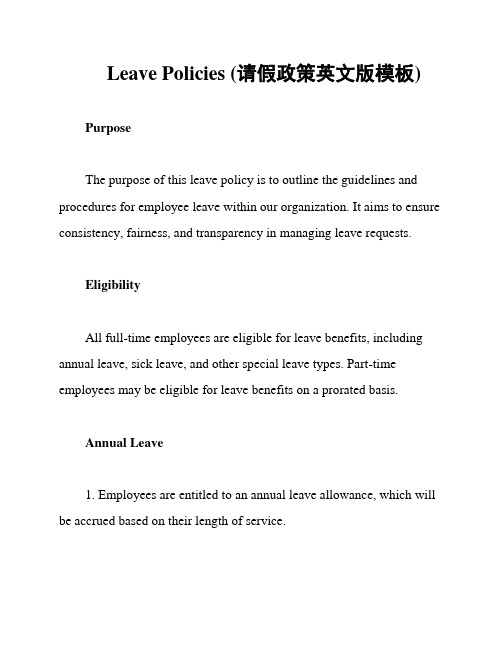
Leave Policies (请假政策英文版模板) PurposeThe purpose of this leave policy is to outline the guidelines and procedures for employee leave within our organization. It aims to ensure consistency, fairness, and transparency in managing leave requests.EligibilityAll full-time employees are eligible for leave benefits, including annual leave, sick leave, and other special leave types. Part-time employees may be eligible for leave benefits on a prorated basis.Annual Leave1. Employees are entitled to an annual leave allowance, which will be accrued based on their length of service.2. The annual leave allowance will be calculated as {X} days per year for employees with less than {Y} years of service, and {Z} days per year for employees with {Y} years or more of service.3. Annual leave must be approved in advance by the employee's supervisor or manager.4. Employees are encouraged to plan and take their annual leave ona timely basis to maintain work-life balance.Sick Leave1. Employees are entitled to sick leave to attend to their own illness or injury, or to care for an immediate family member.2. Sick leave may be taken for a maximum of {X} consecutive days per illness/injury, or a total of {Y} days per year.3. A medical certificate may be required for sick leave exceeding {Z} consecutive days.4. Sick leave must be reported to the employee's supervisor or manager as soon as possible.Special Leave1. In addition to annual and sick leave, employees may be eligible for special leave in certain circumstances, such as bereavement leave, maternity/paternity leave, or jury duty leave.2. Special leave requests must be made in advance and supported by appropriate documentation.3. Approval of special leave is subject to management discretion and the needs of the organization.Leave Request Procedure1. Employees should submit leave requests through the designated leave management system.2. Leave requests must be submitted at least {X} days in advance, except in cases of unforeseen or emergency situations.3. The leave management system will notify employees of the status of their leave requests.4. Supervisors or managers have the right to deny or reschedule leave requests based on operational needs.5. Employees should ensure that accurate leave records are maintained.Consequences of Unauthorized Absences1. Employees are required to obtain prior approval for all leave requests.2. Absence from work without proper approval may result in disciplinary action.3. Excessive unauthorized absences may lead to termination of employment.Confidentiality1. All leave-related information, including reasons for leave, will be treated confidentially.2. Supervisors and managers should use discretion when discussing an employee's leave with others.Policy Review---。
劳动合同法 已用年假的规定

劳动合同法已用年假的规定英文回答:Annual Leave under the Labor Contract Law of the People's Republic of China.The Labor Contract Law of the People's Republic of China (LCL) provides for the following regulations regarding annual leave:1. Entitlement to Annual Leave.Employees are entitled to annual leave after meeting certain criteria, including the length of their employment and the nature of their work.Full-time employees who have worked for more than one year are entitled to at least five days of paid annual leave.This period of leave can be extended to 10 days or more for certain categories of employees, such as those engaged in hazardous or arduous work.2. Duration and Scheduling of Annual Leave.The duration of annual leave is typically determined by the employer, but it cannot be less than the minimum period specified by law.Employers must schedule annual leave in a manner that does not interfere with the normal operation of the business.Employees have the right to request specific dates for their annual leave, but the employer can deny such requests if there is a legitimate business reason to do so.3. Payment During Annual Leave.Employees are entitled to receive their regular wages during the period of their annual leave.Employers cannot deduct any wages from an employee's salary for taking annual leave.4. Accumulation and Rollover of Annual Leave.Annual leave can be accumulated for up to two years if the employee is unable to take it due to unforeseen circumstances.Employers may also allow employees to roll over unused annual leave from one year to the next.5. Denial or Postponement of Annual Leave.Employers can deny or postpone an employee's annual leave request if there is a legitimate business reason to do so, such as a sudden surge in workload or an important business trip.However, employers must provide the employee with reasonable advance notice of such a denial or postponement.6. Penalties for Violations.Employers who violate the provisions of the LCL regarding annual leave may be subject to fines or other penalties.Individual employees also have the right to file a complaint with the labor authorities if their employer denies or postpones their annual leave request without a legitimate reason.中文回答:劳动合同法关于年假的规定。
“带薪休假”的若干说法

⾸个“瘦⾝版”五⼀假期圆满结束。
国家旅游局统计数据显⽰,从5⽉1⽇⾄3⽇,全国共接待游客近900万⼈次,同⽐下降近三成。
虽然五⼀休假时间“缩⽔”了,但我们却可以根据国务院颁布的《职⼯带薪年休假条例》享受带薪年休假,从⽽避开旅游⾼峰,⾃主安排出游时间。
今天我们就来说说“带薪年休假”以及“带薪休假”⽤英语该怎么说。
⼀、带薪年休假 paid annual leave和annual paid leave均可 例1:如英国某站提供的说法是:From 1 October 2007 all workers have a statutory right to at least 4.8 weeks paid annual leave (that's 24 days paid holiday if you work five days a week). 例2:英国另⼀站在介绍英国带薪年休假增加到每年24天时的说法是:The Government introduced the right to 20 days' paid annual leave in 1998. It proposes to phase in the additional leave starting with an increase from 20 to 24 days (pro rata for part time workers) from 1st October 2007. 例3:⽇本某站则是如此介绍“带薪年休假”的:"Annual paid leave" means workers can take any days off they like, except fixed holidays, while being paid wages for regular work days. ⼆、带薪休假 paid time off、paid leave、paid vacation和paid holiday均可,表达“休带薪假”,使⽤动词take即可。
annual leave 名词

annual leave 名词"Annual leave"是指员工每年所获得的休假期,也被称为年假或年度休假。
1. My company offers 20 days of annual leave to all employees.我的公司为所有员工提供20天的年休假。
2. Karen is planning to take her annual leave in December to spend the holidays with her family.卡伦计划在12月份休年假,与家人一起度过假期。
3. Employees are required to submit a request for annual leave in advance to ensure proper staffing.员工需要提前提交年假申请,以确保适当安排人员。
4. The amount of annual leave accrued depends on the number of years an employee has worked for the company.累计年假的总数取决于员工在公司工作的年限。
5. John had to cancel his annual leave because of an urgent project at work.约翰不得不取消年假,因为工作上有紧急项目。
6. The company policy states that annual leave cannot be carried over to the following year.公司政策规定年假不能延期至下一年。
7. It's important to plan your annual leave well in advance to ensure you have enough time for personal activities.提前安排好年假非常重要,以确保有足够的时间进行个人活动。
Annual Leave 年假
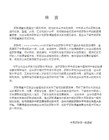
Feifei: 英国的劳工制度很健全,所以除了带薪年假外,职工还可以享受其它假期。
Helen: We'll go through some of them very quickly here. For example,
maternity leave can be up to one year.
have an impact on his financial earnings.
Feifei:
收入
earnings. Michael 休假是没有工资的,所以他尽量会在没有工作的时候
去度假。
Helen: Even though there's no paid annual leave or other company benefits,
Feifei: Annual leave 或者
annual holiday 就是年假,英国人一年的带薪年假到底有多少
天?
Insert
Am I allowed to answer that? Well it's three, four weeks.
20 days.
Pro rota 23 days.
eight public holidays.
Feifei: That makes it 33 days of holiday in total. 一般大公司或者政府部门,会给
职员们更多一些假期,像在
BBC,我们一年有
25天假,在加上
8天公休假
日,一共
33天。
Helen: What about part-time workers, how many days of annual leave do
职工带薪年休假条例(英文)

职工带薪年休假条例中华人民共和国国务院令第514号《职工带薪年休假条例》已经2007年12月7日国务院第198次常务会议通过,现予公布,自2008年1月1日起施行。
总理温家宝二○○七年十二月十四日职工带薪年休假条例第一条为了维护职工休息休假权利,调动职工工作积极性,根据劳动法和公务员法,制定本条例。
第二条机关、团体、企业、事业单位、民办非企业单位、有雇工的个体工商户等单位的职工连续工作1年以上的,享受带薪年休假(以下简称年休假)。
单位应当保证职工享受年休假。
职工在年休假期间享受与正常工作期间相同的工资收入。
第三条职工累计工作已满1年不满10年的,年休假5天;已满10年不满20年的,年休假10天;已满20年的,年休假15天。
国家法定休假日、休息日不计入年休假的假期。
第四条职工有下列情形之一的,不享受当年的年休假:(一)职工依法享受寒暑假,其休假天数多于年休假天数的;(二)职工请事假累计20天以上且单位按照规定不扣工资的;(三)累计工作满1年不满10年的职工,请病假累计2个月以上的;(四)累计工作满10年不满20年的职工,请病假累计3个月以上的;(五)累计工作满20年以上的职工,请病假累计4个月以上的。
第五条单位根据生产、工作的具体情况,并考虑职工本人意愿,统筹安排职工年休假。
年休假在1个年度内可以集中安排,也可以分段安排,一般不跨年度安排。
单位因生产、工作特点确有必要跨年度安排职工年休假的,可以跨1个年度安排。
单位确因工作需要不能安排职工休年休假的,经职工本人同意,可以不安排职工休年休假。
对职工应休未休的年休假天数,单位应当按照该职工日工资收入的300%支付年休假工资报酬。
第六条县级以上地方人民政府人事部门、劳动保障部门应当依据职权对单位执行本条例的情况主动进行监督检查。
工会组织依法维护职工的年休假权利。
第七条单位不安排职工休年休假又不依照本条例规定给予年休假工资报酬的,由县级以上地方人民政府人事部门或者劳动保障部门依据职权责令限期改正;对逾期不改正的,除责令该单位支付年休假工资报酬外,单位还应当按照年休假工资报酬的数额向职工加付赔偿金;对拒不支付年休假工资报酬、赔偿金的,属于公务员和参照公务员法管理的人员所在单位的,对直接负责的主管人员以及其他直接责任人员依法给予处分;属于其他单位的,由劳动保障部门、人事部门或者职工申请人民法院强制执行。
员工带薪年休假制度
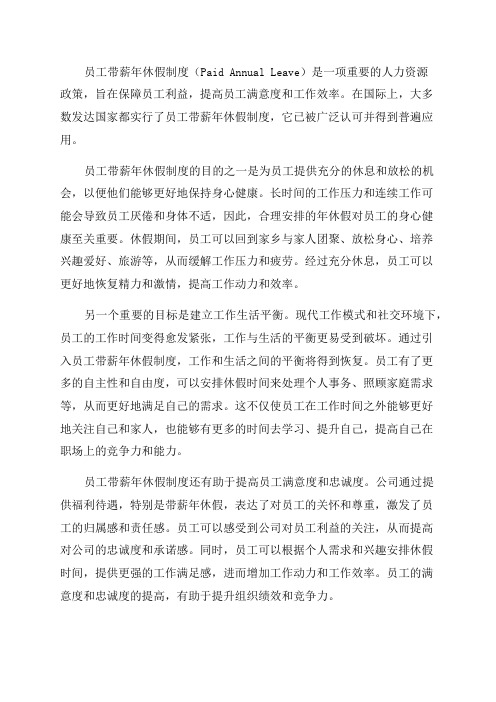
员工带薪年休假制度(Paid Annual Leave)是一项重要的人力资源政策,旨在保障员工利益,提高员工满意度和工作效率。
在国际上,大多数发达国家都实行了员工带薪年休假制度,它已被广泛认可并得到普遍应用。
员工带薪年休假制度的目的之一是为员工提供充分的休息和放松的机会,以便他们能够更好地保持身心健康。
长时间的工作压力和连续工作可能会导致员工厌倦和身体不适,因此,合理安排的年休假对员工的身心健康至关重要。
休假期间,员工可以回到家乡与家人团聚、放松身心、培养兴趣爱好、旅游等,从而缓解工作压力和疲劳。
经过充分休息,员工可以更好地恢复精力和激情,提高工作动力和效率。
另一个重要的目标是建立工作生活平衡。
现代工作模式和社交环境下,员工的工作时间变得愈发紧张,工作与生活的平衡更易受到破坏。
通过引入员工带薪年休假制度,工作和生活之间的平衡将得到恢复。
员工有了更多的自主性和自由度,可以安排休假时间来处理个人事务、照顾家庭需求等,从而更好地满足自己的需求。
这不仅使员工在工作时间之外能够更好地关注自己和家人,也能够有更多的时间去学习、提升自己,提高自己在职场上的竞争力和能力。
员工带薪年休假制度还有助于提高员工满意度和忠诚度。
公司通过提供福利待遇,特别是带薪年休假,表达了对员工的关怀和尊重,激发了员工的归属感和责任感。
员工可以感受到公司对员工利益的关注,从而提高对公司的忠诚度和承诺感。
同时,员工可以根据个人需求和兴趣安排休假时间,提供更强的工作满足感,进而增加工作动力和工作效率。
员工的满意度和忠诚度的提高,有助于提升组织绩效和竞争力。
然而,员工带薪年休假制度的实施也面临一些问题和挑战。
首先,工作任务和工作流程的合理安排对员工带薪年休假的顺利进行非常重要。
现代工作节奏快,工作任务繁重,因此需要合理预留员工的休假时间,避免员工休假期间工作无法正常进行。
其次,员工的替补安排也是一个难题。
在员工休假期间,如何保证工作的持续性是一个需要解决的问题。
年假英文-
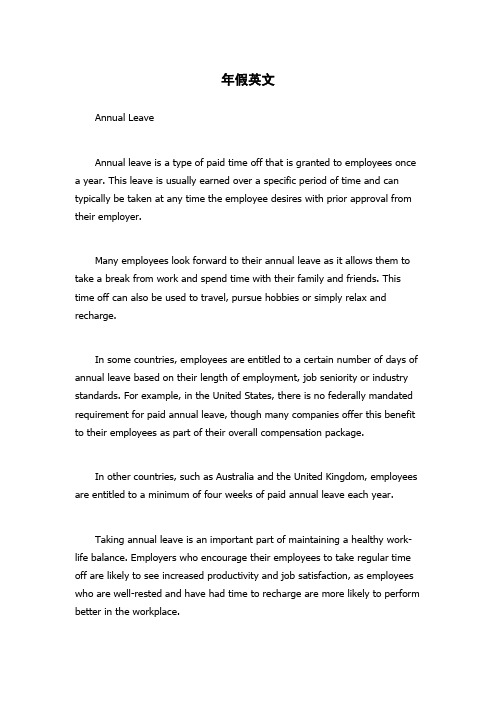
年假英文Annual LeaveAnnual leave is a type of paid time off that is granted to employees once a year. This leave is usually earned over a specific period of time and can typically be taken at any time the employee desires with prior approval from their employer.Many employees look forward to their annual leave as it allows them to take a break from work and spend time with their family and friends. This time off can also be used to travel, pursue hobbies or simply relax and recharge.In some countries, employees are entitled to a certain number of days of annual leave based on their length of employment, job seniority or industry standards. For example, in the United States, there is no federally mandated requirement for paid annual leave, though many companies offer this benefit to their employees as part of their overall compensation package.In other countries, such as Australia and the United Kingdom, employees are entitled to a minimum of four weeks of paid annual leave each year.Taking annual leave is an important part of maintaining a healthy work-life balance. Employers who encourage their employees to take regular time off are likely to see increased productivity and job satisfaction, as employees who are well-rested and have had time to recharge are more likely to perform better in the workplace.Overall, annual leave is an important benefit for employees and an effective tool for employers to help maintain a happy and productive workforce.。
- 1、下载文档前请自行甄别文档内容的完整性,平台不提供额外的编辑、内容补充、找答案等附加服务。
- 2、"仅部分预览"的文档,不可在线预览部分如存在完整性等问题,可反馈申请退款(可完整预览的文档不适用该条件!)。
- 3、如文档侵犯您的权益,请联系客服反馈,我们会尽快为您处理(人工客服工作时间:9:00-18:30)。
职工带薪年休假条例(英文版)国务院令[2007]第514号2007年12月14日Announcement of the State Council on the Regulations of Paid Annual Leave of EmployeesOrder of the State Council [2007] No. 514December 14, 2007The Regulations of Paid Annual Leave of Employees adopted at the 198th General Meeting of the State Council on December 7, 2007 are hereby promulgated and shall be effective as of January 1, 2008.Primer: Wen Jiabao,Appendix: Regulations of Paid Annual Leave of EmployeesArticle 1 These Regulations are formulated in accordance with the Labor Law and the Public Servants Law in order to protect the rights to rest days and annual leave of employees and deploy employees to actively discharge their duties.Article 2 The employees of units such as authorities, organizations, enterprises, institutions, private non-enterprise units andindividually-owned commercial and industrial businesses with employees that have been worked continuously for more than one year are entitled to paid annual leave (hereinafter referred to as "annual leave"). Units shall guarantee that employees are entitled to annual leave. Employees taking annual leave are entitled to the wages of a normal working day.Article 3 Where an employee has served one full year but less than 10 years accumulatively, he is entitled to five days of annual leave. If he has served 10 full years but less than 20 years, annual leave is 10 days. If he has served for 20 full years, annual leave is 20 days.Article 4 An employee is not entitled to annual leave for the current year if he is under any of the following circumstances:1. The employee is entitled to summer and winter vacations in accordance with the law and the number of days of such vacations is more than that of his annual leave;2. The employee has taken more than 20 days of casual leave accumulatively and his unit does not deduct wages in accordance with provisions;3. The employee has served one full year accumulatively but less than 10 years and has taken more than two months of sick leave accumulatively;4. The employee has served 10 full years accumulatively but less than 20 years and has taken more than three months of sick leave accumulatively;5. The employee has served more than 20 full years and has taken more than four months of sick leave accumulatively.Article 5 Units shall coordinate and arrange for the annual leave of employees on the basis of the specific conditions of production and work and the individual preference of employees.Annual leave may be centrally arranged within one year or in several periods and does not span more than one year in general. Units may make such arrangement that spans more than one year if they have a genuine need for such arrangement due to production and job specialties.Units that cannot arrange for annual leave for employees due to job requirements, they may not arrange for annual leave with the consent of such employees. In respect of the annual leave that should have been taken but otherwise, units shall pay wage remuneration to such employees at the rate of 300% of the daily wage income of such employees.Article 6 The personnel department and the labor security department of people's governments at the county level or above shall actively conduct supervision and examination on the implementation of these Regulations by units in accordance with their authority.Labor organizations shall protect the rights to annual leave of employees in accordance with the law.Article 7 Where a unit fails to arrange for annual leave for employees and pay wage remuneration on annual leave in accordance with the Regulations, the personnel department or the labor security department of people's governments at the county level or above shall order rectification within a time limit. If no rectification is made within the time limit, such unit shall be ordered payment of wage remuneration on annual leave and also make additional compensation to employees on the basis of the amount of the wage remuneration of annual leave. Where no wage remuneration on annual leave or compensation is made, and the personnel of such units are public servants or administered with reference to the Public Servants Law, the person-in-charge that is directly responsible and other directly responsible personnel shall be punished in accordance with the law, if such unit belongs to other categories, the labor security department, the personneldepartment or the employee shall apply for compulsory implementation by a people's court.Article 8 Where employees and units have dispute over annual leave, it shall be dealt with in accordance with the relevant laws and administrative regulations of the state.Article 9 The personnel department of the State Council and the labor security department of the State Council shall formulate implementing procedures of the Regulations respectively in accordance with their respective authority.Article 10 The Regulations shall be effective as of January 1, 2008。
